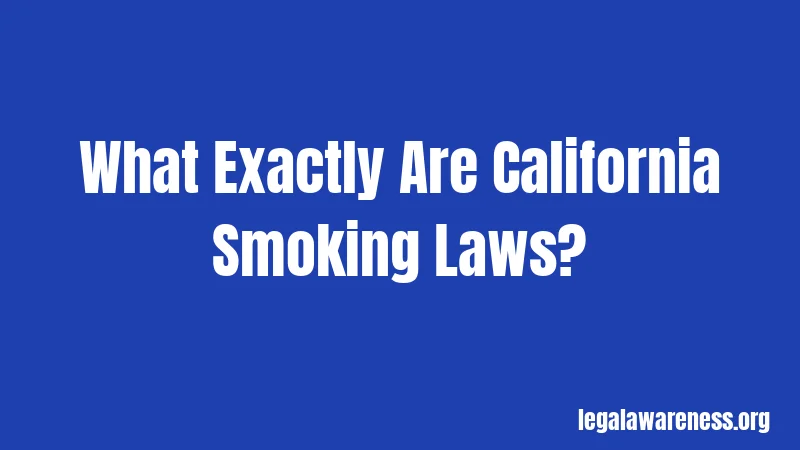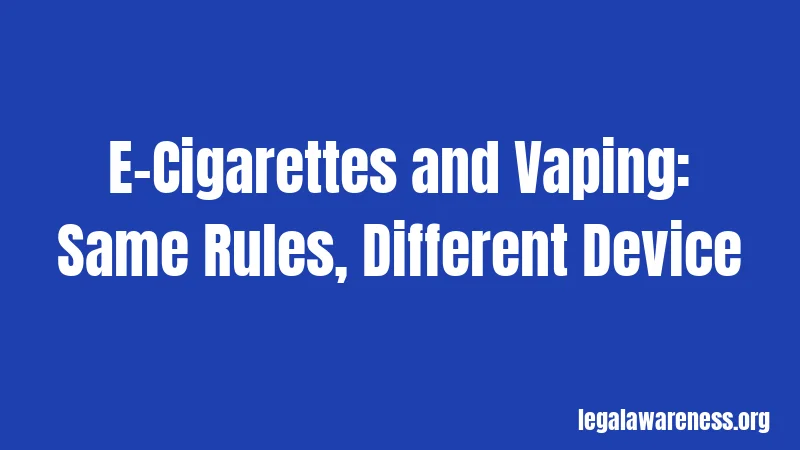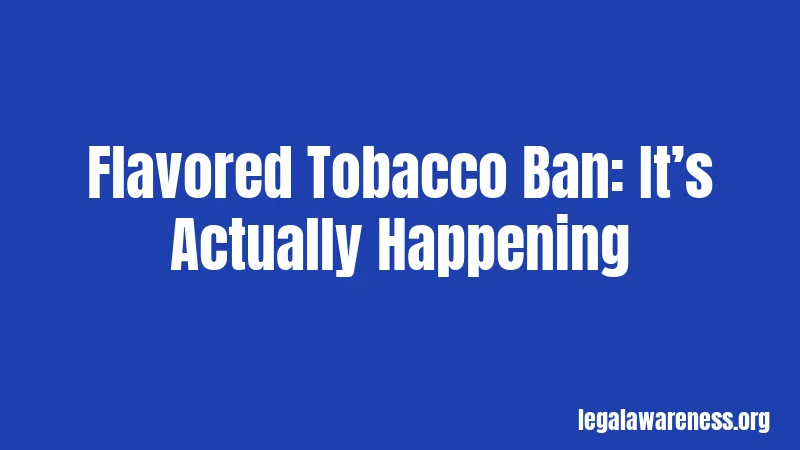California Smoking Laws (2026): What Could Cost You Big
Most people think smoking laws are just about lighting up wherever you want. But California? California has some of the strictest tobacco regulations in the country. And honestly, the penalties can be serious.
Here’s the thing: you could be breaking the law without even realizing it. Maybe you’re smoking in a place you thought was okay. Or vaping somewhere you assumed was legal. Stay with me here, because this stuff actually matters if you live in or visit California.
What Exactly Are California Smoking Laws?

California’s smoking laws are pretty straightforward in concept. The state restricts where you can smoke, who can buy tobacco products, and how they’re advertised. But the details? They get complicated fast.
Think of it like this: smoking is legal in California, but where and how you do it is heavily regulated. The state has passed hundreds of local and statewide laws targeting different aspects of tobacco use. So simple!
The Basics: Where You Can’t Smoke
Let’s start with the big one. There are places in California where smoking is basically off-limits. Breaking these rules can get expensive.
Inside Buildings and Workplaces
You cannot smoke inside any building where people work or where the public is allowed. That includes offices, restaurants, bars, and retail shops. Even if you own the place, you can’t light up inside.
Wait, it gets broader. This also applies to vehicles used for business purposes. If you’re driving a company car or truck, smoking inside is illegal. Wondering if this applies to you? If you’re working, the answer is probably yes.
Apartments and Multifamily Housing
This one surprises people. California allows landlords to ban smoking in apartments and condos. Many of them have. If your lease says no smoking inside your unit, you’re legally bound to follow it. The landlord can fine you or even evict you.
Here’s where it gets interesting: even if your lease allows smoking, many cities have banned it entirely in multifamily housing. Los Angeles is one of them. Berkeley is another. So check your local rules, not just your lease.
Restaurants and Bars
Okay, pause. Read this carefully. California banned smoking in bars and restaurants back in 1998. That’s over 25 years ago. Yet people still ask about this every single day.
You cannot smoke inside any restaurant, bar, or nightclub. Period. This applies even if there’s a separate bar area or outdoor patio if you’re technically under a roof. No exceptions.
Vehicles with Minors
This is probably the most common violation we see. You cannot smoke in a vehicle if there’s anyone under 18 inside. California law is clear on this one.
It doesn’t matter if the windows are down. It doesn’t matter if you’re driving or parked. If a minor is in the car and you’re smoking, you’re breaking the law. Pretty straightforward.
Parks, Beaches, and Outdoor Recreation
Many cities prohibit smoking in parks. Some beaches do too. San Diego banned it on public beaches. Same with Santa Cruz. San Francisco banned it in all parks and on the beach.
Not sure what counts as a violation? Check with your city or county. Rules vary depending on where you are. The state law allows cities to set their own restrictions for outdoor areas.
E-Cigarettes and Vaping: Same Rules, Different Device

Here’s where most people get confused. E-cigarettes and vape pens follow basically the same rules as traditional cigarettes in California. If you can’t smoke a cigarette somewhere, you can’t vape there either.
That indoor workplace ban? It includes vaping. The vehicle with minors rule? Same thing. Restaurants and bars? You can’t vape inside them. Honestly, this is the part most people miss.
California treats vaping products almost identically to cigarettes when it comes to where you can use them. The big difference is the ingredients and how they’re marketed, not where you can actually use them.
Age Restrictions: 21 and Up
California raised the legal smoking age to 21 in 2016. That’s younger than you might think compared to other states.
You must be at least 21 years old to buy cigarettes, vaping products, or any tobacco products in California. No exceptions. The rules are strict, and so are the penalties for selling to minors.
If you’re under 21 and caught with tobacco products, you could face citation. If you’re 18, 19, or 20, California actually offers a program where you can avoid penalties by completing a tobacco education course. Trust me, that’s a better option than a fine.
Flavored Tobacco Ban: It’s Actually Happening

Wait, it gets better. California banned flavored tobacco products entirely. Yes, really. All of them. That includes menthol cigarettes, fruit-flavored vaping liquids, and flavored cigars.
This ban started rolling out in 2022 and is in full effect now. You cannot legally sell, distribute, or market flavored tobacco in California. Period. The only exception is for traditional cigars (which are actually pretty rare in regular shops).
Wondering if this affects you? If you’re looking to buy flavored products, you won’t find them legally in California anymore. If you’re selling them, you’re breaking the law.
Packaging and Marketing Restrictions
California has strict rules about how tobacco can be advertised and sold. For example, you cannot display tobacco products in self-service displays. They must be kept behind the counter.
Tobacco advertising near schools is prohibited. That includes billboards within 600 feet of a school. Advertising that targets minors is banned. Images of minors using tobacco products are forbidden in ads.
This might seem unimportant, but it matters if you own a retail business selling tobacco. If your signs or displays violate these rules, you could face penalties.
Penalties: What Actually Happens
Now let’s talk about what happens when you break these laws. The consequences vary depending on the violation.
Smoking in a Non-Smoking Area
For most violations like smoking where it’s prohibited, you could face a fine ranging from $100 to $250 for your first offense. A second offense within 12 months? That’s $200 to $500. A third violation? Up to $500.
Think of it like a traffic ticket, but stricter. These aren’t just warnings. These are actual citations that go on record.
Smoking in a Vehicle with Minors
This one carries heavier penalties. Your first violation is a $100 fine. A second violation within a year is $250. A third is $500. The fines add up quickly if you keep getting caught.
Plus, California considers this a preventable offense. It can affect your driving record. Some insurance companies might increase your rates.
Selling to Minors
If you sell tobacco to someone under 21, the penalties are serious. You’re looking at a minimum $250 fine for a first offense. A second offense within 12 months is a minimum $500 fine. A third offense is a minimum $1,000 fine.
For businesses, it gets worse. You can lose your retail license for selling tobacco. If you lose that license, you can’t legally sell any tobacco products for years.
Vaping Product Violations
Selling e-cigarettes to minors carries serious penalties. California treats vaping products like traditional tobacco for enforcement purposes. The fines are comparable to selling cigarettes to minors.
If you’re a business selling these products, you need age verification systems. You need training for employees. Get caught selling to a minor, and you’re facing substantial fines and possible license suspension.
Local Laws: Even Stricter Than the State
Here’s something important: many California cities have passed laws even stricter than the state. San Francisco banned smoking in most outdoor areas. Los Angeles banned smoking in apartments. Some cities ban it in parks, beaches, and bus stops.
Your city might have rules you don’t know about. You could be complying with state law but breaking local ordinances. Sound complicated? It is. Do yourself a favor and check your city’s website or call city hall.
For example, if you smoke in a San Francisco park where it’s prohibited locally, you could face a fine from the city. The state might not fine you, but your city will.
Medical Cannabis: Different Rules
Wait, this is important. California has different regulations for cannabis compared to tobacco. While both are restricted in many places, cannabis has its own set of rules under Proposition 64.
In general, you cannot smoke cannabis in the same places where you can’t smoke tobacco. But some cities allow cannabis consumption in private lounges, which isn’t true for cigarettes. Cannabis edibles have entirely different restrictions.
If you’re thinking about using cannabis in California, treat it with the same caution as tobacco. Don’t assume the rules are the same, because they’re not always.
Getting Legal Help: When to Talk to Someone
If you’ve been cited for a smoking violation, you have options. You can pay the fine, or you can challenge it.
You can request a hearing to contest the violation. You can hire a lawyer to represent you. Many of these fines can be negotiated, especially if it’s your first offense and the circumstances were unclear.
Don’t just pay a fine and accept it. Especially if you genuinely didn’t know about a local rule. A lawyer who handles tobacco violation cases can sometimes get the fine reduced or dismissed entirely.
Frequently Asked Questions
Can I smoke on my apartment balcony in California? Depends on your lease and your city. Many landlords prohibit balcony smoking. Some cities do too. Check both before you light up. You could be violating your lease agreement even if city law allows it.
Is vaping legal inside a building in California? No. Vaping is subject to the same indoor smoking bans as cigarettes. You cannot vape in workplaces, restaurants, bars, or most other public buildings. Many cities extend the ban to all indoor spaces.
What’s the penalty if I smoke in a car with a kid? First offense is $100. Second offense within 12 months is $250. Third is $500. It’s also reported to the California Department of Motor Vehicles, which could affect your driving record.
Can restaurants have a smoking section anymore? Absolutely not. California banned smoking sections in restaurants in 1998. There are no exceptions, even for private clubs or separate areas. If it’s indoors and it’s a restaurant, smoking is prohibited.
Where can I legally smoke in California? You can smoke outside in most places unless local law prohibits it. Your home (if you own it or your lease allows it) is generally okay. Some cars, depending on circumstances. But always check local rules because cities add restrictions constantly.
Final Thoughts
California’s smoking laws are strict, and they keep getting stricter. The state is serious about reducing tobacco use. If you smoke, vape, or sell these products, you need to know the rules where you live.
Here’s the bottom line: know your state law, check your local ordinances, read your lease carefully, and when in doubt, ask before you smoke. Don’t assume. Don’t guess. Look it up or talk to your city.
The good news? Once you understand the basics, it’s actually pretty straightforward. Stay informed, follow the rules, and you’ll avoid hefty fines and legal trouble. Now you know the basics. Stay smart, and when questions come up, check your city’s website or call the California Department of Public Health.
References
- California Department of Public Health: Tobacco Control Program – https://www.cdph.ca.gov/Programs/CCDPHP/DCDIC/CTCP/Pages/index.aspx
- California Legislative Information: Tobacco Laws – https://leginfo.legislature.ca.gov/
- California Health and Safety Code Section 104495 et seq. (Smoke-Free Workplace Law)
- San Diego County Health and Human Services: Smoke-Free Laws – https://www.sandiegocounty.gov/
- American Nonsmokers’ Rights Foundation: California Laws – https://www.no-smoke.org/
- California Department of Tax and Fee Administration: Tobacco Tax – https://cdtfa.ca.gov/
- City of Los Angeles Official Website: Smoking Regulations – https://www.laCity.gov/
- California Proposition 64 Information – https://cannabis.ca.gov/
